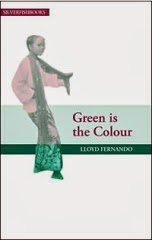Llyod Fernando’s second novel ,Green is The Colour ,completed almost two decades after his first
novel,Scorpion Orchid In Green is the colour,fresh violence erupts in the
racial riots in Malaysia (13 May 2013).Again, a set of multi-racial characters
is used to develop the novels ideas.Yun Ming ,the Chinese who hasn’t been
absorbed into the system as the government official is beginning to question
the dominant discourse ,in particular ,ideas on unity which the authorities ate
touting .Dahlan ,once his university mate and now a lawyer looks with contempt
on Yun Ming’s afflication with the political powers.Dahlan himself tries to
bait the conscience of the authorities by speaking out on the need for
religious tolerance after the members of Chinese religious sect and their
leader,Ti Shuang being arrested not because of any crime they commited but
because they appear to authorities to be a threat to public security .Omar the
second important Malay character ,fed up with what she deems the decandence of
Western ways which have tarnished the race, seeks return to spiritual
protection of fundamentalist Islam. Important as these male characters are it
seem to me that Fernando gives prominence to the woman character, Siti Sara.A
large portion of the last segment of the novel is told in her first person
narrative or seen through her concsiousness.
When the novel opens,the violence engendered by the riots
has not ceased .Roadblocks necessitate detours tension is so high that is does
not take much to ignite fresh eruptions. The country itself appears to have
been divided into zones even as its multi-racial populace huddle into safe
spaces.Against such a scenario,we are not surprised that some of the main
characters (Siti Sara,Dahlan) undergo the horrors of rape,incarceration and
torture.But over above this physical violence,is the more insidious violence
that is done to men’s minds and their powers of clear and sincere expression. Language
has been debased into counterfeit coinage in order to mask lies or purvey-half
truths.as dahlan see it “I have lived all my life by words.I have seen make
them do anything they wanted. That the evil I have fought.
No real connection between people can be possible when
there is so much muddle and so little willingness to be clear.Fernando
skillfully evokes an atmosphere of fear and suspicion in which many prefer to
be listeners rather than risk voicing deeply –felt truths .These self-imposed
silences are volubly filled by other voices such as that Wan Nuruddin,the
secretary General in the Department of Unity,discoursing confidently on
Confusion ethics and loyalty to the government.In the post May 13th
ambience ,an artificial togetherness has been created to prevent more painful
soul searching .Siti Sara admits that’s she develops and clung to the use of
plural personal pronoun because it stirred feeling and love for her fellow
citizens whether Malay,Chinese,Indian or Eurasian.In fact “ she had embraced a
specious feeling of togetherness with
people in the abstract to cloak her unease,to disguise her semi-instinctive
need not to know.”Like Yun Ming,she begins to see that official rhetoric merely
covers the facts that racial lines are
clearly drawn so as to reinforce a sense of them” and “us”.in this context ,the
shadowy figure of another women,Neemlambigai alias Fatimah binti Abdullah whose
body neither her relatives nor the Religiuous Department would claim,haunts the
reader as a sad reminder of intolerance and bigotry on all sides.Her family
considers her an outsider because of her traversing of religious and racial
barriers and the Religious Department will not accept her as being of the faith
since there is no proof of conversion.Dahlan himself discovers that it is not so easy to simply
say, “ I don’t care for you beliefs,I will bury her.
The individual in such a society is constantly under
surveillance .Nearly all the main characters have a sense of being watched. The
leitmotif of eyes is skullfully manipulated
to reinforce an Orwellian sense that one’s every move known ,noted and
filled away for future reference .Panglima,Political Secretary to the Minister
Of Home Affairs ,whose basilisk stare unsettle even it mesmeries has files on
everyone.Such an atmosphere breeds paranoia ,even madness.The more sensitive
members of the society against the tension and strain having to choose one’s
words before speaking.Dahlan we learn,had already had a nervous breakdown while
still an undergraduate.Siti Sara,the returnee from American university ,who now
lectures in a local institution ,feels
as if she is under the close scrutiny of collegues, students and even her own
husband ,Omar who wants her to quit job,follow him to Tok Guru Bahauddin’s community
in Jerangau. That her internal turmoil threatens to spill over is conveyed I various
intances.looking at the flowers in the compound of her kampong to which she has
returned to seek some respite she feels as if the hibiscus exploded in her
field of vision …..One flower glowed so intensely bright that is seemed aflame
and she gazed at it thunderstruck .She stood before a molten furnace door..It
was inexpressibly wonderful to the point of being terrifying and steered away
from the disquieting splendor,fearing madness.”
The novel‘s many scenes of violent sexual encounters.For
example,between Yun Ming and Sara, and Sara and her husband show the desperate coming
together of people whose inner lives are
intensely disturbed .Yun Ming violent possession of Sara is like an urgent
effort to transcend loneliness and the consciousness that one has been pawn in
the political games of the powers that be. Omar takes Siti Sara with unseeing
eyes in narcissistic frenzy. A refusal to see other points of view propells him
towards the confined space of Tok Guru Bahauddin ‘s domain where one can be
away from the tarnishing contact with Western.
Source
:
Fernando,Lloyd.Green Is The Colour .Kuala Lumpur ; Silverfish Book , 2004.Print

No comments:
Post a Comment